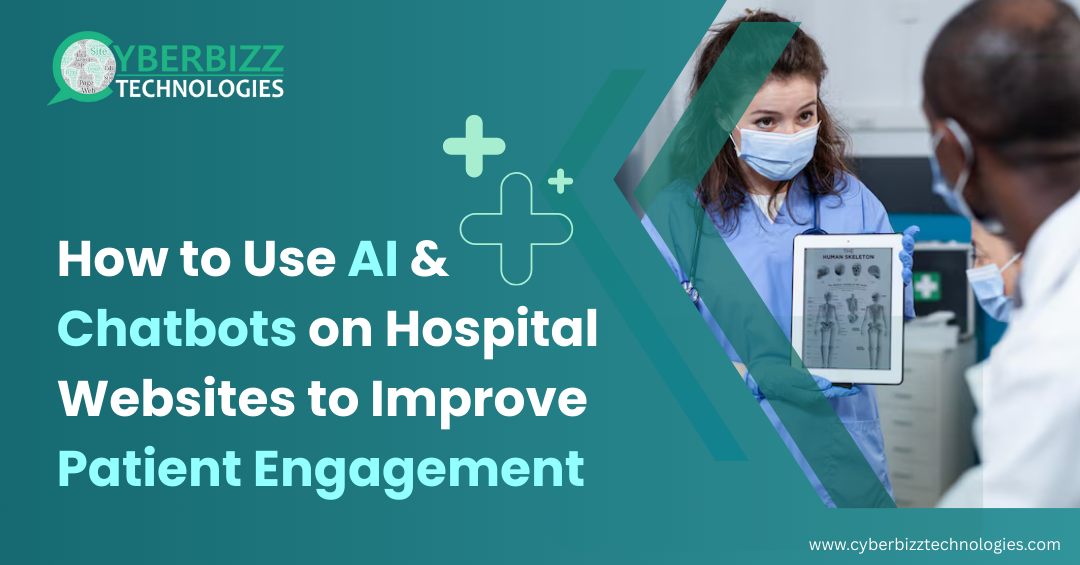
How to Use AI & Chatbots on Hospital Websites to Improve Patient Engagement
Introduction
In 2025, artificial intelligence (AI) and chatbots will have become essential tools for hospitals looking to improve patient engagement, streamline operations, and enhance healthcare experiences. With more patients searching for instant responses and 24/7 support, hospitals must leverage AI-powered chatbots to provide efficient communication, appointment scheduling, symptom assessment, and more.
This blog explores how hospitals can integrate AI and chatbots into their websites to engage patients, boost efficiency, and enhance healthcare services.
1. Why Hospitals Need AI & Chatbots?
Benefits of AI-Powered Chatbots for Hospitals
✔ 24/7 Patient Support – No waiting times for answers.
✔ Faster Appointment Booking – Reduces the hassle of calling hospitals.
✔ Instant Answers to FAQs – Reduces workload for hospital staff.
✔ Symptom Checking & Triage – Helps patients understand their conditions.
✔ Improved Patient Experience – Personalized and real-time interactions.
✔ Data Collection & Insights – Helps in decision-making and service improvements.
Example: A hospital with an AI chatbot reduced patient call volume by 40%, allowing staff to focus on urgent cases.
2. How AI & Chatbots Improve Patient Engagement
2.1. 24/7 Virtual Assistance
Patients often have urgent health concerns outside of hospital hours. AI chatbots provide:
✔ Instant answers to medical inquiries
✔ Guidance on hospital services
✔ Support for emergency contacts
Example: A patient experiencing chest pain at midnight can chat with the hospital’s AI assistant to check whether immediate medical attention is required or if they can wait until morning.
2.2. AI-Powered Appointment Scheduling
Manually booking appointments through phone calls can be time-consuming. AI chatbots allow:
✔ Easy scheduling & rescheduling
✔ Automated appointment reminders
✔ Integration with hospital calendars
Example: A chatbot on a hospital’s website helped reduce missed appointments by 30% by sending automated reminders.
2.3. Symptom Checker & Pre-Diagnosis
AI chatbots analyze patient symptoms and suggest possible conditions before seeing a doctor.
✔ Asks simple questions about symptoms
✔ Suggests potential health issues
✔ Guides patients on next steps (visit hospital, book appointment, or home care)
Example: A hospital in the U.S. integrated an AI-powered chatbot that assessed symptoms and guided patients to the right specialist, improving diagnostic accuracy by 20%.
2.4. Answering Common FAQs
Hospitals receive frequent patient queries like:
-
What are your visiting hours?
-
What insurance plans do you accept?
-
Do you offer teleconsultations?
Instead of overwhelming the front desk, chatbots provide instant responses, improving efficiency.
Example: A hospital chatbot reduced FAQ call volume by 50%, allowing receptionists to focus on urgent cases.
2.5. Medication & Post-Treatment Follow-ups
AI chatbots help patients stay on track with their treatment plans by:
✔ Sending medication reminders
✔ Offering post-treatment guidelines
✔ Checking patient recovery progress
Example: A chatbot at a diabetes clinic reminded patients to take insulin, improving adherence rates by 35%.
2.6. Health Education & Awareness
Chatbots educate patients on topics like:
✔ Disease prevention & symptoms
✔ Lifestyle recommendations
✔ Hospital services & health tips
Example: A hospital chatbot provided COVID-19 guidance, reducing misinformation and patient panic.
3. Best AI Chatbot Platforms for Hospitals
- Hospitals can use advanced chatbot platforms like:
- HealthTap AI – Virtual health assistants for symptom checking
- Infermedica – AI-driven pre-diagnosis tools
- Botsify – Custom chatbots for hospitals
- Tars – AI chatbots for appointment booking & FAQs
4. How to Implement AI & Chatbots on Your Hospital Website
✔ Step 1: Identify Patient Needs – Determine what the chatbot should do (e.g., appointment booking, symptom checking).
✔ Step 2: Choose the Right Chatbot – Select a chatbot that integrates with your hospital’s website & patient management system.
✔ Step 3: Train the AI Model – Ensure the chatbot understands medical terminology and provides accurate responses.
✔ Step 4: Integrate with EHR & CRM Systems – Connect chatbots with hospital databases for personalized patient interactions.
✔ Step 5: Monitor & Improve Performance – Regularly update chatbot responses based on patient feedback & real-world usage.
5. Future of AI in Hospital Websites
✔ AI Voice Assistants – Chatbots with voice recognition for seamless communication.
✔ Predictive Analytics – AI forecasting patient health trends for proactive care.
✔ Virtual Healthcare Assistants – AI-driven chatbots handling full patient journeys from diagnosis to treatment.
Conclusion: AI & Chatbots are the Future of Patient Engagement
Hospitals that integrate AI-powered chatbots on their websites can improve patient experience, streamline processes, and boost engagement. From 24/7 support to symptom checking and appointment booking, chatbots provide efficient healthcare solutions while reducing hospital workload.
Want to implement an AI chatbot for your hospital? Get started today and enhance patient engagement!
Content Created By:

CyberBizz Technologies
Team - Content Curator